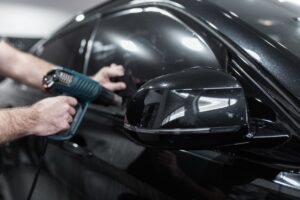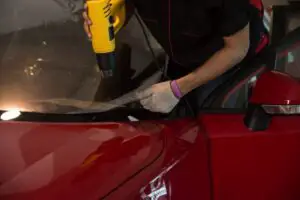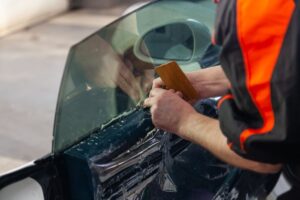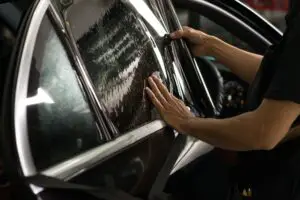Dark window tinting does provide privacy to the driver, but it also works as an obstacle for the traffic police and other concerned authorities.
Tinting laws should be taken seriously as they are a part of every state law.
While the law is updated according to the changing world while the law enforcement agency makes sure they are being followed.
Pennsylvania window tint laws clarify how much visual light they require for every vehicle.
The basic requirement is 70% VLT for the front window and windshield, except for the upper three inches.
Also, the VLT should be 70% for the back and rearview windows. The limitations are different for passenger and multi-purpose vehicles.
There is much to the tinting law, but the detail mentioned above is the essence for getting your vehicle tinted. The rest of the details will be discussed in the sections later.
Table of Contents
- 1 How Much Tint Darkness Is Legal In Pennsylvania?
- 2 Window Tint Reflection And Tint Colors
- 3 Medical Exemption Of Window Tint Laws In Pennsylvania
- 4 Get A Certified Sticker From The Company
- 5 Other Window Tint Law Rules And Regulations In Pennsylvania
- 6 Cost Of Car Window Tint In Pennsylvania
- 7 Frequently Asked Questions
- 8 Conclusion
How Much Tint Darkness Is Legal In Pennsylvania?

Different states have their laws, some are fairly strict, and some are very strict.
Pennsylvania is a state that takes its laws regarding everything very seriously. The same goes for the tint darkness.
The allowed tint darkness in Pennsylvania is 70% VLT overall, which means for the front windows, back seat windows, and rearview windows.
The only exception is for the upper three inches of the windshield.
The darkness of tint is calculated by VLT, which is the visual light transmission required for every vehicle.
It does protect you from the UV rays, but it also makes it easier for police to do their jobs right.
Tint Darkness Limit For SUVs And Vans
SUVs and vans are multipurpose vehicles that have the orders under the 1996 PenDot regulations that the front window and the windshield must allow 70% of contacting sunlight or light.
At the same time, the upper three inches of the windshield and an exception, but no metallic reflective material should be used.
Apart from that, there are no requirements for any percentage of tints on the back seat windows and the rear view windows.
Tint Darkness Limit For Sedans
The Pennsylvania car window tint law suggests a detailed section for sedans that I’ll review below now.
1. Front Windshield
Similarly, the windshield must also allow 70% of contacting light through the window, except for the upper three inches, which can be a spot for direct sunlight.
2. Front Seat Side Windows
For any sedan, the law dictates that the front windows, both passenger and driver’s windows, have a tint of 70% VLT.
3. Rear Window
For a sedan, no matter if it is pre-1998 or post-1998; all cars still have their windows tinted with a 70% VLT.
4. Back Seat Side Windows
There are no exceptions for back seats as well. They should allow 70% of visual light transmission.
Window Tint Reflection And Tint Colors
- The window tint law for sedans is 70% VLT overall on all windows, with the three-inch exception for the windshield. But there should be no mirrored, reflective, or metallic material used.
- Similarly, for SUVs and other multi-purpose vehicles, the font and windshield should have a 70% VLT and the back three windows have no darkness limitations. But the material used should be non-reflective or mirrored.
- The state of Pennsylvania does not restrict any color of tint unless it is reflective.
Medical Exemption Of Window Tint Laws In Pennsylvania

According to the tint law, medical exemptions are allowed in the Pennsylvania state.
The tint can be of any darkness if the medical exemption is granted.
The exemption has a proper guided procedure and will require a series of authorization to prove your claim is true.
If you are a resident of Pennsylvania, have a registrant of a vehicle, owner, or registrant of a household who regularly drives or is driven in the vehicle.
Then you are eligible to apply for the medical exemption if that is required.
You will have to go to your state-registered physician or an optometrist and get a note authorizing your medical condition claim.
Once you have your doctor’s note, you will have to go down to your nearest local motor vehicle office and get an exemption certificate and a sticker that the office will provide you.
The law for medical exemption is not that strict, but it does require a justified reason.
Get A Certified Sticker From The Company
There are no requirements for the tint film manufacturers according to Pennsylvania to certify their tint to the customer.
But a legally certified sticker on the tinted windows is required in the state of Pennsylvania.
The sticker can be obtained from the local motor vehicle office to check your tint VLT and then provide you with a sticker.
Another case where you may need a certified sticker is in case of medical exemption, which will require a special tint sticker and a letter from your doctor that should be presented when asked for.
Other Window Tint Law Rules And Regulations In Pennsylvania
Window tint rules and regulations have been reviewed thoroughly in the sections above for sedans and muti-purpose vehicles.
While the basics have been explained, a few things should not be missed because there are serious charges and penalties for breaking the law.
- If you have a tinted window, a sticker should certify the legally permitted tint, 70% VLT overall for sedans.
- The front two windows and the windshield need certification for SUVs and minivans.
- If the rearview window is tinted, there will be a requirement for both dual sides, non-tinted side mirrors to be properly used.
- The windshield has an exception for the upper 3 inches which can be darker, but no reflective or metallic material should be used.
Though the points mentioned are minor, things like these can skip our minds, so make sure to have all the correct information before tinting your car window.
Cost Of Car Window Tint In Pennsylvania
In Pennsylvania, if you are looking to get your car tinted, which should be 70% VLT, the minimal cost for the film will be $50 – $600.
But if you are looking for a more sleek-looking tint, then the cost for ceramic, metallic, or any specialty tint will be around $100 – $800.
For a 4-doored sedan, the cost of dyed film will be around $202.40 to $240.59. If you are looking for a basic solar tint, it will cost you $5.58 to $7.43 per square foot.
The cost also includes the craftsmanship of the motor vehicle shop, but if you decide to do it on your own, you can always get a DIY kit off the internet that costs around $100 and tint your car.
Frequently Asked Questions
Q1. Is 15% Tint Legal In Pennsylvania?
If you have a medical exemption certified sticker for special tint, other than that, no, 15% tint is not legal in Pennsylvania.
Q2. Are 5% Tints Legal In Pennsylvania?
5% tints are not legal in Pennsylvania for sedans but for the back and rearview windows of SUVs and minivans these are legal.
These are also legal if you have a medical exception sticker.
Q3. Is Limo Tint Legal In Pennsylvania?
No, the limo tint is not legal in Pennsylvania. The allowed VLT tint for passenger cars is 70% for all windows, unless you have an SUV and want the backseat windows darker.
Q4. Can I Get Pulled Over For Tint In Pennsylvania?
Yes, if you are found to violate the law, you will be pulled over and face the consequences.
Q5. How Much Is A Tint Ticket In Pennsylvania?
If you are caught violating the law for illegal tinting, you would be charged almost $110 or more.
Conclusion
The Pennsylvania tint laws were passed in 1999 and have been followed ever since.
The laws are supposed to be taken seriously. If the law dictates 70% overall VLT for Sedans, it should be abided by.
These laws are enforced by the law enforcement agency set in every state.
While Pennsylvania has no requirements for back and rearview windows of SUVs and minivans, they have strict regulations for sedans.
The rules and regulations for tinting in Pennsylvania State have been provided and thoroughly discussed.
These laws are written in stone and cannot be challenged. Anyone violating them will be charged.
If you have a medical exemption note, the authorities should be aware of it and present it if asked.

I am Tahir Azam, and I have been writing amazing articles for TaxiHack for as long as I can remember. I know everything that is to know when it comes to automobiles and is always on top of industry news and developments. While I am not an expert by any means, I pride myself on knowing the ins and outs of many different problems and, of course, their solutions. The articles on our website are some of the best and well-researched content that you will find, and I spend countless hours making sure this remains to be true. This is why I ask you to take your time out and read some of my articles, especially if you find a topic that resonates with you or is something you are looking into. This way, you will find the perfect mix of information and tips on your desired topic. Learn more about Tahir.




